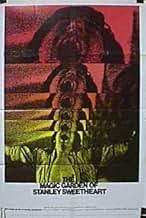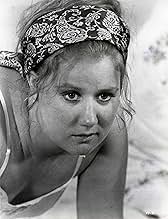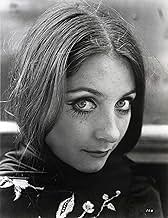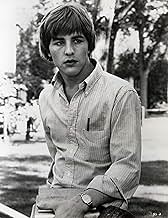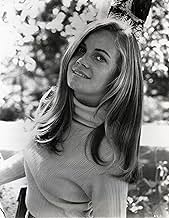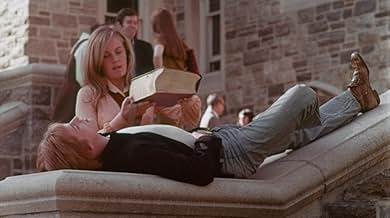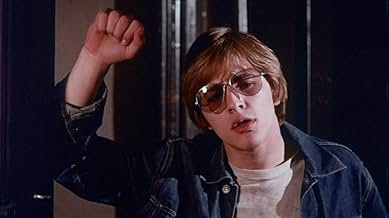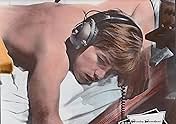Basada en una novela semiautobiográfica de Robert T. Westbrook, la película trata sobre un joven de 23 años que abandonó la Universidad de Columbia (Stanley Sweetheart) y busca su identidad ... Leer todoBasada en una novela semiautobiográfica de Robert T. Westbrook, la película trata sobre un joven de 23 años que abandonó la Universidad de Columbia (Stanley Sweetheart) y busca su identidad durante la revolución sexual.Basada en una novela semiautobiográfica de Robert T. Westbrook, la película trata sobre un joven de 23 años que abandonó la Universidad de Columbia (Stanley Sweetheart) y busca su identidad durante la revolución sexual.
- Premios
- 1 nominación en total
Alpha Blair
- Edenbar Patron
- (sin créditos)
Karen Lynn Gorney
- Alicia
- (sin créditos)
Barbara Maggio
- Alison
- (sin créditos)
Parker McCormick
- Danny's Mother
- (sin créditos)
Geri Miller
- Extra
- (sin créditos)
Stanley Wagner
- John - Bartender
- (sin créditos)
Opiniones destacadas
Robert T. Westbrook adapted his own acclaimed, semi-autobiographical novel about a Columbia University student in his third year who drops out (a fashionable way of expressing yourself in 1970). The protagonist, Stanley Sweetheart (hailed by literary critics at the time as a successor to Holden Caulfield), is played in the film by a young, high-voiced Don Johnson, whose performance failed to impress Village Voice critic Molly Haskell (she remarked, "The only thing that stands out about Don Johnson is the black roots of his blond hair."). Self-assured, sex-obsessed Stanley lives off-campus in his own apartment: he makes 16mm films; he hates the noise of construction-ridden New York City; he swats at bugs on the carpet; he disgustedly wads up a letter from his woebegone mother, who wonders if he'll ever have a productive life. So far, so good (except for the Michel Legrand/Alan and Marilyn Bergman-composed opening song--some woozy thing that asks if a tree falls in a forest...). There's a lot of talk about pot smoking, decadent materialism, "being free to really be free", masturbation, getting laid, also an attempted homosexual pickup (which freaks our hero out). Westbrook and director Robert Horn want their movie to connect with the kids but not in a direct way (that might be too square). Instead, Horn and his editor give us a somewhat fragmented look at a young man's life in 1970; however, Stanley's day-to-day non-routine doesn't really require this kind of jagged treatment (for instance: when Stanley deflowers the pretty girl in his linguistics class, the moment is extra tender, followed by a bubblegum-music montage of boy-girl coupling with 'cute' nudity). It isn't much of a picture--and one that MGM apparently had no invested interest in--but Johnson is a definite presence (especially in his scenes with Holly Near as his girlfriend's roommate and Michael Greer as a former student at Juilliard). The milieu, now dated, is interesting as a time capsule (including a cameo by Candy Darling at a drug orgy); but "Magic Garden" isn't a magical character study--it's stunted by its overall narrow view of life. When kids try to act like grown-ups but realize they're really just dumb kids, the audience is apt to respond, "What else is new?"
** from ****
At university I was part-time apsirant film-maker, part-time aspirant womaniser, and full-time aimless waster. Unsurprisingly this film struck a huge chord with me, when I stumbled across it during those bewildering days!
A great little film, lots of fun, just don't expect any niceties like, erm, a recognisable plot or a meaningful ending. The film-within-a-film - Stanley's outrageously bad student short "Headless" - is a real hoot and worth the price on its own!
Oh and if you like this, check out student rebellion in "The Strawberry Statement" and more of the young Don Johnson in "A boy and his dog", both recommended.
A great little film, lots of fun, just don't expect any niceties like, erm, a recognisable plot or a meaningful ending. The film-within-a-film - Stanley's outrageously bad student short "Headless" - is a real hoot and worth the price on its own!
Oh and if you like this, check out student rebellion in "The Strawberry Statement" and more of the young Don Johnson in "A boy and his dog", both recommended.
Freak-out anything-goes flick from 1970, does a great job of capturing east-coast hippie scene. Some of the scenes from this movie must have been very shocking to the few who saw it upon its initial release, as it pulls no punches in its depiction of nudity and sex and sex and nudity. More or less, this movie seems to have been made to reflect the emerging sexual openness and promiscuity of the time. Not much of a story line, but entertaining to watch, i would recommend it for those looking for a fix of late '60's/early '70's underground culture. A definite drug movie. Do not watch while operating heavy machinery...
This could be the definitive film of Andy Warhol's New York sub-culture...and a rare one to find at that! It captures the decadence, the confusion, the drugs, the music and the 'boredom' of this underground world, and it all revolves around the character of Stanley Sweetheart. Don Johnson, in his first film role, plays this character brilliantly, capturing all of this insatiable desire for sensation in this beautifully androgynous performance. There also seems to be an underlying text of hidden homosexual desires, which Stanley continually suppresses, although he seems drawn to Danny character. It's a fascinating work of decadence and decay, and you can just feel Andy Warhol overlooking the whole world of Stanley's decline.
I saw this movie in 1970 in Philadelphia when it was first released as the second part of a double feature, following Fellini Satyricon. The comment I made when I left the theater (I had graduated from high school only a few days earlier) was, "They co-opted the revolution." If that sentence makes sense to you then you'll understand my reaction. If it doesn't, I can't explain.
Peace! David
Peace! David
¿Sabías que…?
- TriviaAfter the title credits, the movie opens with Stanley (Don Johnson) watching the construction of the World Trade Center twin towers at a very early stage.
- ErroresThe shadow of one of the crewmembers is visible as Stanley walks through the psychedelic corridors of Danny's underworld to arrive at the place where the song "Water" is played.
- Citas
Stanley Sweetheart: Cathy, this is Danny, Shane and Andrea.
Cathy: Hi.
Danny: No, but we're working on it.
- Créditos curiososThe title credit is followed directly by the music credits without even a passing mention to the actors. Only the crew members are credited in the opening credits.
- ConexionesFeatured in Michel Legrand: Sans demi-mesure (2018)
- Bandas sonorasNobody Knows
Music by Michel Legrand
Lyrics by Alan Bergman and Marilyn Bergman
Performed by Richie Havens
Selecciones populares
Inicia sesión para calificar y agrega a la lista de videos para obtener recomendaciones personalizadas
- How long is The Magic Garden of Stanley Sweetheart?Con tecnología de Alexa
Detalles
- Tiempo de ejecución1 hora 57 minutos
- Mezcla de sonido
- Relación de aspecto
- 1.85 : 1
Contribuir a esta página
Sugiere una edición o agrega el contenido que falta

Principales brechas de datos
By what name was The Magic Garden of Stanley Sweetheart (1970) officially released in India in English?
Responda
